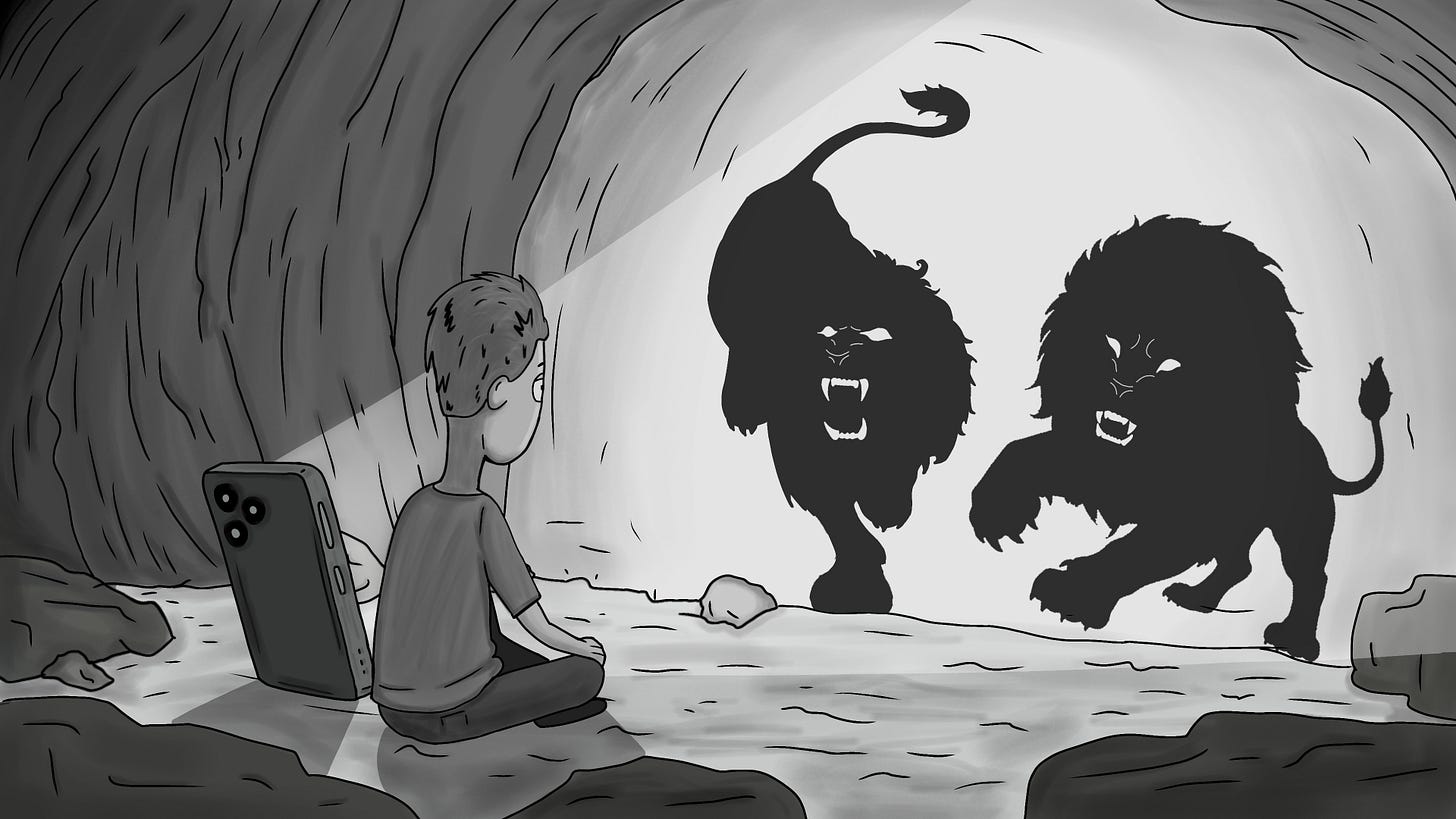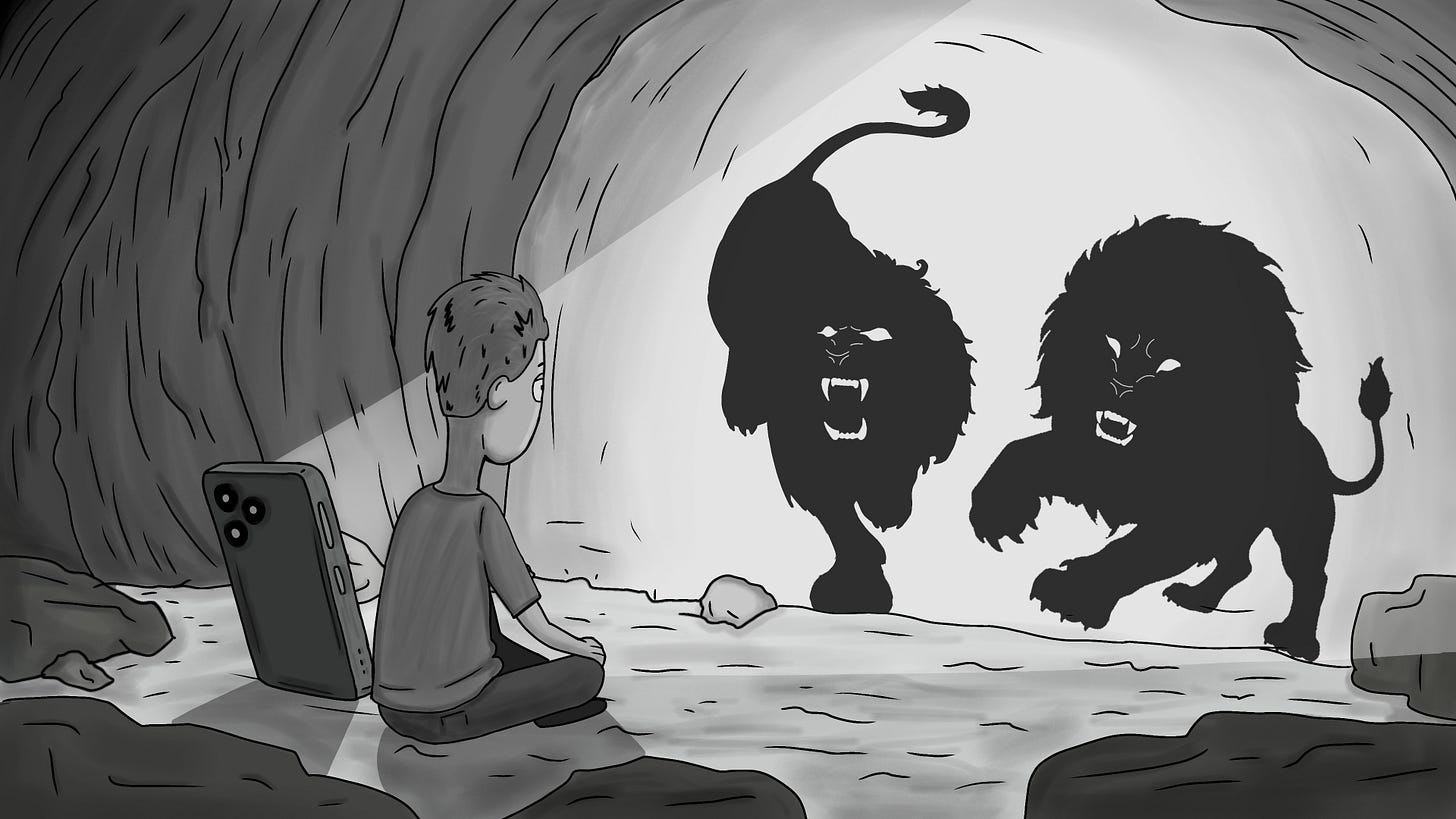You’re Going To Die, And Content Will Kill You
This is how.
When I was 13 years old, I was wandering the streets of Mexico with my father when I met a shirtless woman. She was homeless and naked, her breasts pockmarked by poverty and beaten by the sun. I would later become gay.
‘Gay’ is the joke/surprise of that paragraph — the pockmarked breasts are implied to have an association with me becoming gay, which is clearly not true, but because you were reading, and were then tricked, and then understood the trick, you are now better at sensing trickery and this upgrade in your senses evolutionarily increases your ability to live longer and procreate, and so your brain rewards you with endorphins.
And you feel happy.
There is another chemical, and it’s called dopamine.
Dopamine is basically the thing that tells you, “go get more endorphins,” and it is the chemical currently causing you to read more words on this page because, since you’ve already been rewarded with endorphins once, you are now being fed dopamine so that you desire to read more words in hopes of eventually receiving another endorphin reward.
If, instead of rewarding you with endorphins, I started this piece differently — perhaps with When I was 13 years old, I was wandering the streets of Mexico with my father, and it was nighttime, and a cold breeze crept across the back of my neck, and someone snuck up behind us and placed a gun into the small of my father’s back and then, in a thick, deep voice said, “If you move, I will kill your son,” and I then went on to describe how we were kidnapped, and I cried and screamed, and was bound to the floor as they beat my father and made me watch, and by retelling the story I make YOU watch, this would all trigger a different chemical in your brain: cortisol.
And, in that second story, though the downside is that I would’ve grown up without a father, the upside is that since I wouldn’t have ever run into the pockmarked breasts, the implication would also be that I wouldn’t have ever had to grow up gay.
Endorphins.
Endorphins make you relax and enjoy the fruit, while cortisol spikes your heart rate and readies you to run from the lion.
And it is always more important to run from the lion.
It’s been a few months since Charlie Kirk died, but it was very interesting to see the battle of cortisol and endorphins play out so effectively online.
Like Ukraine, Gaza, Trump, and Mamdani, these topics quickly flow in and out of our overstimulated consciousnesses, and we very quickly forget what we were so passionate about. From time to time, though, it’s nice to pause and examine ourselves, the influenced, to think about how it all works.
For example, when I type ‘Charlie Kirk’ into my inbox, here are the subject lines I see from that period around his death:
Jesus Isn’t Coming to Save You
Full-Blown Authoritarianism
Are Your Kids Secretly Becoming White Supremacists?
All cortisol.
Even with this Substack piece, if I were just optimizing around email open rates, I’d be better off titling it with something cortisol-oriented like:
You’re Going To Die, And Content Will Kill You
Rather than something with just dopamine and a hint of endorphins, like:
I Wore Crocs to a Funeral and You Won’t Believe What Happened Next
You’ll Never Guess What I Found Behind My Fridge
Regarding your content feed, if you were sad about Charlie Kirk’s death, you were most likely seeing that Liberals were very happy, how they were celebrating, and how this was disgusting.
And if you were happy about Charlie Kirk’s death, you were most likely seeing how Republicans were going to hunt down and murder said celebrating evil Liberals.
Talking about a nation coming together after the death, though it probably was what you needed, was not what you were mostly shown, because you will be shown what you are more likely to click on, and you will always click on lions.
The lion clicking effect has moved us all, more quickly than we realize, from social-graph algorithms to discovery algorithms.
We are not ready for this move.
It may end the world.
The former universe of social-graph-based endorphins, Instagram, existed as a space where the 100-1000 people you actually sort of knew posted pictures of weddings, food, birthdays, and travel, but Instagram’s market share has declined due to the rise of “discovery-based” platforms, which, unlike Instagram, prioritize content from a broad group rather than just your friends, and this works very well because lions always get more clicks than baby showers, and it is highly unlikely that your 1,000 closest friends can create as much fear-based-cortisol-ridden content as can the rest of the content-generating world.
Ex: when I make the 15th video recapping my father and me surviving getting beaten up in a Mexican basement, it will be much less interesting to you than a new video made by a stranger talking about how, tomorrow, the Venezuelans/Somalians/insert_immigrant_group are coming for your children.
I will lose your attention.
The other creator will claim your click.
We even tested this at work, and our best video, so far, was actually a combination of cortisol/dopamine/endorphins, with the below AI-generated video.
The video features a hot Asian girl at a bar, who looks at the camera and says, “I’d be into you if you didn’t have such tiny EBIDTA.”
It’s a:
A tiny cortisol spike (I’d be into you)
A little bit of dopamine (If)
Followed by endorphins (TinyPenis=TinyEBIDTA)
We made it for twenty cents, it took us less than an hour, and it generated a 7x higher click-through-rate than anything else we’ve made. And a high click-through-rate is good.
We’ve thought about automating all of our future ad creation.
Building an AI agent that creates B2B videos, publishes them on its own, and then, depending on the video’s performance, rewrites, re-generates, and again publishes, but I fear we’d risk ending up with something clickbait and cringe like B2B porn: a BDSM Salesforce Exec whipping an Early-Stage Startup until her core assets climax with liquid capital, or something maybe more cortisol-focused about how, if your company doesn’t hire out company, your business is going to fail: a video with an anthropomorphized version of your-logo-here hanging by a noose in a medieval square as a crowd of angry investors yell, “SHORT. DUMP. DELIST,” until your company’s writhing logo-body finally stops.
And both of these videos would be bad for brand equity.
But if we didn’t care.
Or if we were, let’s say, a creator with a political agenda or someone who solely hoped to generate revenue from ad dollars, it’s most likely that our video creation AI would, in a very short time, get extremely adept at generating content faster than viewers would be able to learn how to discern that said content was not factual, nor good for them, nor real.
And I think that’s where we are.
We are at the point where cortisol-ridden AI-generated content will soon constantly rise to the top of our algorithm-based feed, and many of us will fall victim to becoming radicalized by things that may or may not be real — our only hope being that enough of us have enough endorphins in our offline lives to motivate us into self-regulation and putting down our phones, and like gazelles, we shake off the stress of having been chased by lions that, for a moment, made us believe that everything was falling apart.
Don’t forget, by nearly every long-term measure — health, education, poverty, even war — the world is still objectively a much better place than it ever has been.
All the counterarguments against the sentence above are tiny blips, capturing too much of your attention, that you choose to focus on due to your individual inability to go out into the world and find endorphins.
Your stress.
Your anger at everyone who doesn’t politically agree with you.
Your inability to want to make the world a better place without losing your mind.
You: sitting in a cave, on a cortisol drip, staring at shadows of lions, believing they’re all real.
If you enjoyed reading this, send it to someone who you think is politically exhausting to be around. Maybe that someone is you!
If you want to read something more flowery and funnier, try this one.
If you want something more business-y, here ya go.
Fun fact: the title of this post was A/B/C tested, so whichever title is at the top of this page might be different from the one you received in your inbox.
I’ll post the results later on.
Questions for you to answer in the comments — if you’re reading this via email, click here to leave a comment:
How old are you
How happy are you in your life (1-10)
Is that more or less than it was for you 10 years ago
Do you have compassion and/or intellectual space for people who totally disagree with you politically? I imagine that if your answer here is “no,” you’re not going to comment because as you read this question you are feeling defensive lol
What do you do to prevent yourself from falling into an echo-chamber of only consuming media that you fully agree with




Most of the people I know who are of my generation are happy, but... I also know that most people in our culture, in their eighties are not. I worked for many years in nursing homes where I saw and experienced the loneliness of the abandoned and sick, warehoused to die. Sad.
I am 86. I am very happy in my life, happier than ten years ago. I am a retired psychiatrist, fine art painter, and author. I am happiest in my marriage, now of thirty years. We grow happier and more in love daily. I do not choose to stimulate my cortisol. I no longer worry about my, or anyone's future. I choose contentment. I realize the power of choice in my life.